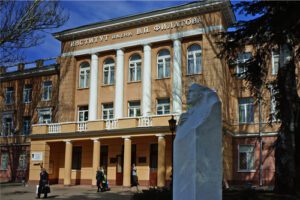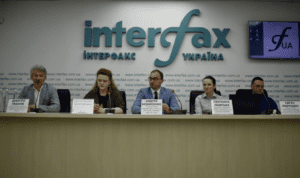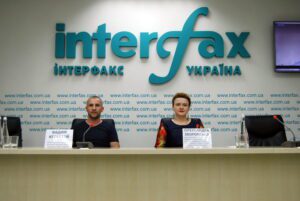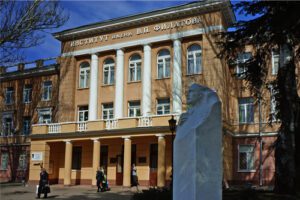
The Institute of Eye Diseases and Tissue Therapy named after V.P. Filatov (Odesa) received medical devices and medicines as part of the Shelter Ukraine charitable initiative, which is being implemented by SiLab Ukraine, Valores Foundation, Teple Misto charitable organization, Vplyv charitable organization in cooperation with Razom For Ukraine.
The clinic told the Interfax-Ukraine agency thanks to this initiative, the institute, in particular, was able to obtain suture materials, medical devices and medicines.
The received medical devices and consumables are used, among other things, in corneal transplantation operations, said Halyna Drozhzhina, the head of the department of pathology and microsurgery of the cornea of the eye.
“Such interventions are almost always the patient’s last chance not to lose sight, and they can only be done with such tools,” she stressed.
She pointed out that during the COVID-19 pandemic and the start of the war, “people hesitated and turned to ophthalmologists at the wrong time.”
“The number of patients in need of such interventions has increased. Therefore, such assistance is extremely necessary for us, it will help prevent vision loss in dozens of patients from different parts of Ukraine,” she said.
The clinic stressed that during the war, the institute, like in peacetime, continues to provide highly specialized ophthalmological care to patients from all over Ukraine, including citizens who were evacuated from the zone of active hostilities.

The French Quantel medical, with the assistance of the Ukrainian Embassy in France, donated it to the Institute of Eye Diseases and Tissue Therapy named after Filatov (Odessa) as a humanitarian aid a new probe (sensor) for the Aviso apparatus for ultrasonic biomicroscopy of the anterior eye.
As Interfax-Ukraine was informed at the clinic, up to 5,000 patients need to be examined on the Aviso device annually, in particular, to detect and monitor the state of intraocular tumors and neoplasms of the conjunctiva of the eye.
In addition, the need for probe-assisted examination increases during the war for patients with trauma, foreign bodies in the anterior part of the eye, chemical and thermal burns.
In the spring of this year, the institute had an urgent need for a new sensor, since the existing one actually failed. The sensor for each device is made individually.
During the war, the clinic was not able to update the equipment on its own, in particular, due to funding limitations, the lack of a sensor in Ukraine, disruption of supply chains and delivery difficulties.
“Administration, doctors and patients of the clinic of the Institute of Eye Diseases and Tissue Therapy named after Filatov wholeheartedly express their gratitude to the General Director of Quantel medical, Mr. Jean-Marc GENDRE / Jean-Marc GENDRE and the company’s employees for the provided humanitarian assistance and the Embassy of Ukraine in France for their invaluable help and support,” the clinic emphasized.

The majority of medical experts, who had fled abroad due to the Russian full-scale invasion of Ukraine, have come back and continue to work, practitioners and experts in the sphere of medicine said during a roundtable discussion hosted by the Interfax-Ukraine News Agency on Thursday.
“For the moment, 98% of personnel are in place. Some of them left for western Ukraine or abroad in the first months of the war, however, today almost all of them have come back and continue to work,” Head of the Department of Cardiometabolic Diseases of the Clinic for Adults of the State Institution “Center for Pediatric Cardiology and Cardiac Surgery of the Ministry of Health of Ukraine,” PhD in Medical Sciences Yevhen Marushko said.
“Speaking about the personnel of the Filatov Institute, almost none of our employees left. Some 99% of our personnel stay here. There is a shortage of specialists in very specific profiles as there are few of them all over the country. If specialists, whom we already lack, leave, this has a negative impact on the level of medical assistance,” ophthalmologist of the highest category, head of the department of inflammatory pathologies of the eye and microsurgical treatment of their consequences at state institution “Filatov Institute of Eye Diseases and Tissue Therapy of the National Academy of Medical Sciences of Ukraine” Oleksandra Zborovska said.
In turn, Business Development Director of ADONIS medical group of companies Svitlana Lonska said that the majority of the personnel of private medical institutions have returned, while those who are abroad also plan to come back soon.
Despite the fact that a maternity hospital was destroyed during large-scale military operations in Kyiv region, the doctors did not suspend their work and had to deliver babies under emergency conditions, she stressed.
At the same time, Head of the Department of Nephrology and Renal Replacement Therapy of the National University of Health Protection, owner of the Nephrology Clinic, Professor Dmytro Ivanov noted that the doctors and senior staff, who have returned to Ukraine, thus proved the level of their reliability.
“In the first two months we lost more than 60% of doctors and around 75% nurses in Kyiv in the first two months. Almost no medical personnel remained in the districts of Ukraine where military operations were conducted. Around 90% of medical staff have returned as of today. I think this could be considered a criteria of reliability of doctors and senior staff, for example, heads of departments and chief doctors,” Ivanov said.
Chief Physician of the National Cancer Institute, PhD in Medical Sciences Andriy Beznosenko said that the patient flow significantly reduced at the National Center Institute in the first month of the war.
“We received 150 patients during the first month of the war, while last year we received 2,700 patients during the same period of time,” he said.
The expert also noted that the specialists of the National Cancer Institute do the utmost to monitor the situation with the oncology centers in the temporarily occupied territories.
“Today, Kherson, Melitopol, Mariupol oncology centers and the one in Krasnyi Luch are under occupation. They lack personnel and there are patients there. But there are no medicines for treatment and we are unable to deliver them,” Beznosenko said.
ADONIS, FILATOV INSTITUTE, ZBOROVSKA, БЕЗНОСЕНКО, ИВАНОВ, МАРУШКО

Ukraine may become the first country to describe in detail civilian medicine during the war, practitioners and experts in the field of medicine expressed this opinion during a round table at the Interfax-Ukraine agency on Thursday.
“We can become the first nation to describe civilian medicine in detail during the war. Today there is nothing like it. There is only military medicine in war conditions, these are one-sided NATO and Russian articles,” said Andrey Beznosenko, head physician of the National Cancer Institute.
He noted that there have never been articles, information from a country that systematically analyzes what happened to civilian medicine during the war.
At the same time, Svetlana Lonskaya, business development director of the ADONIS medical group of companies, said that ADONIS has introduced medical field teams for the affected regions.
According to her, a group of two or three narrow specialists is being created who travel to the affected regions and provide free medical advice to those who wish.
She also noted that ADONIS is working on creating a more stable form of stem cells for easier transportation, as they are now transported frozen at a constant low temperature.
Lonskaya predicts that the innovative form of stem cells could be stored as a cream or hydrogel patches.
In turn, the head of the Department of Inflammatory Eye Pathologies and Microsurgical Treatment of Their Consequences of the VP Filatov Institute of Eye Diseases and Tissue Therapy of the National Academy of Medical Sciences of Ukraine Oleksandra Zborovskaya spoke about the need to create a supra-cluster ophthalmological center.
“The war convinced us of the need to create a supra-cluster ophthalmological center, since it is more profitable for the state to finance even the patient’s travel to the only center in the country where he can receive a closed cycle of ophthalmological care. Telemedicine has not justified our hopes. In ophthalmology, many things cannot be standardized, and methods There are simply no objective diagnostics,” Zborovskaya said.
Head of the Department of Cardiometabolic Diseases of the Clinic for Adults of the State Institution “Center for Pediatric Cardiology and Cardiac Surgery of the Ministry of Health of Ukraine” Yevhen Marushko emphasized that the Ukrainian healthcare system has survived and continues to develop.
“Is there any other country in the world where new departments, new programs, new buildings, new directions are opened during the war? Our healthcare system has not only survived, it is developing,” Marushko said.
Кардіодіабет 1 дня
ADONIS, CIVILIAN MEDICINE, FILATOV INSTITUTE, WAR, БЕЗНОСЕНКО, ЗБОРОВСКАЯ, ЛОНСКАЯ, МАРУШКО

Post-COVID rehabilitation is necessary for patients even at the time of stay in a medical facility, and 20-40% of patients who have recovered will suffer from post-COVID syndrome, a number of experts voiced this opinion during a press conference at Interfax-Ukraine. “Out of 100% of people who are sick with COVID-19, some 20% need hospitalization. Some of these patients need hospitalization in intensive care units, as well as mechanical ventilation. Rehabilitation for such patients is necessary even in the intensive care unit, especially for patients with artificial lung ventilation. Rehabilitation is also important for patients who move from the intensive care unit to the hospital,” Vadym Kerestey, the head of the rehabilitation department of the Adonis network of medical clinics, said.
At the same time, the expert emphasized that currently in Ukraine, very few rehabilitation measures are carried out in intensive care units, and rehabilitation centers do not cover all needs.
He noted that the majority of patients who had been ill in a mild form also need post-COVID rehabilitation, since patients have impairments from different systems. Patients often have tachycardia, lung problems, reduced ability to work, acute disorders of cerebral circulation, thrombosis, which increases the risk of strokes, disorders of the nervous system.

In addition, the country also has a demand for post-COVID rehabilitation among foreigners, the expert emphasized.
Physical therapy is especially important, he said.
“Physical therapy will accelerate the recovery of patients. Physical therapists teach patients to move, breathe correctly, determine the physical condition and the body’s ability to exercise,” Kerestey said.
The head of the department of inflammatory eye pathologies and microsurgical treatment of their consequences of the Filatov Institute of Eye Diseases and Tissue Therapy of the National Academy of Medical Sciences of Ukraine, Oleksandra Zborovska, in turn, noted that patients after coronavirus also need to undergo rehabilitation with ophthalmologists.

“From the point of view of an ophthalmologist, everyone needs rehabilitation, even those who were not sick, since we were all on isolation, which significantly increased the time of contact with gadgets. There is evidence that an increase in myopia in children is recorded. Therefore, visual hygiene and a dosage visual load regimen are of great importance. Regarding post-COVID rehabilitation, patients come with different complaints and need to be observed by a doctor,” she said.
At the same time, Vitaliy Usenko, the medical adviser to Farmak, noted that, according to the latest data, 20-40% of patients who have recovered will suffer from post-COVID syndrome.
“Post-COVID syndrome has been included in the international classifier of diseases. The Ministry of Health of Ukraine has signed an order with a protocol for rehabilitation care for patients with coronavirus disease. It is impossible to implement the protocol with the help of one health system, and it is very good that rehabilitation services appear,” he added.
According to Usenko, during post-COVID rehabilitation, drugs that are used in the treatment of COVID-19 can be used, but only as directed by a doctor.
FARMAK, FILATOV INSTITUTE, KERESTEY, REHABILITATION, USENKO, ZBOROVSKA, АДОНИС

The Filatov Institute of Eye Diseases and Tissue Therapy of the National Academy of Medical Sciences of Ukraine (Odesa), after the end of the coronavirus (COVID-19) pandemic, intends to resume work on the creation of branches in other countries, Director of the institute Natalia Pasechnikova has said.
“The demand for ophthalmological medical services is growing all over the world. The lack of highly qualified specialists has created the preconditions for the signing of memorandums on the establishment of branches of the institute in other countries [currently in China and Bulgaria]. Unfortunately, this issue is still difficult due to the pandemic. However, I hope that after humanity cope with the pandemic, we will be able to resume these projects,” she said in an interview with Interfax-Ukraine.

According to Pasechnikova, the institute receives offers of cooperation and participation in global international research.
“We have signed agreements on cooperation with organizations and companies in Israel, Switzerland, Germany, Mexico, India, and Hawaii. We cooperate with Linköping University [Sweden] in the development of an artificial cornea; we participate in a global study conducted by the National Institute of Health [U.S.] in the field of research of hereditary ophthalmological diseases and the development of technologies for their diagnosis,” she said.